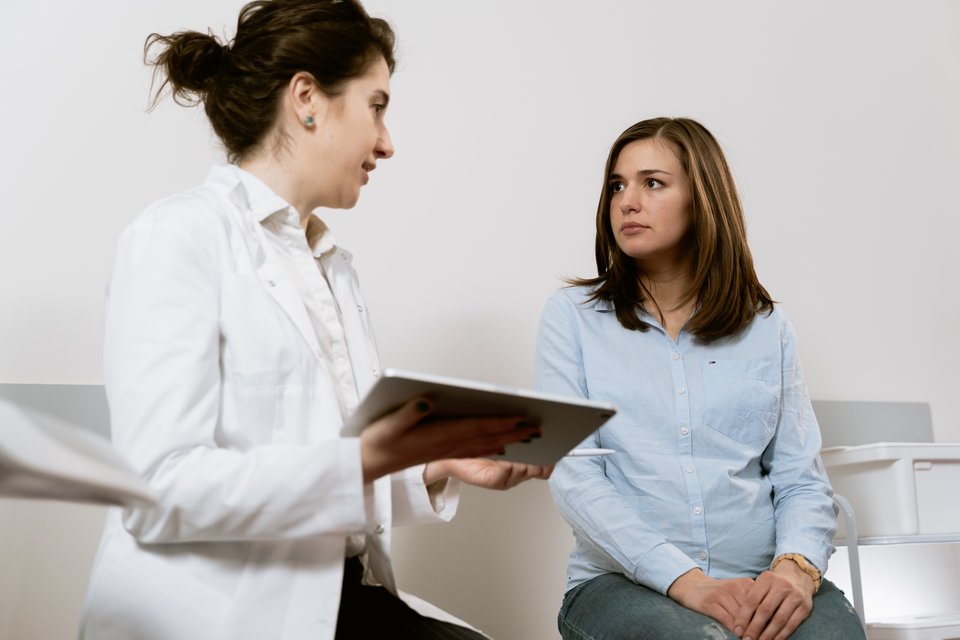Guidance on trauma conversations urgently needed for pregnant women
New research calls for national guidance on trauma and abuse questioning during maternity appointments

National guidelines are needed for healthcare professionals to guide discussions about past traumas with pregnant women, according to new research funded by Wellbeing of Women and the National Institute for Health and Care Research (NIHR).
Traumas such as domestic abuse, childhood trauma or sexual assault affect 250,000 (1 in 3) pregnant women a year in the UK and can have a long-term impact on a woman's mental and physical health. With increased awareness of this, there’s been a move towards asking pregnant women about their previous trauma, usually at the first appointment.
But researchers have described implementation of this in NHS trusts as ‘a piecemeal approach’ with new guidance urgently needed to prevent harm.
"No national guidance on this has been published in the UK so NHS Trusts have implemented this on a piecemeal approach."
Joanne Cull
Lead author & Wellbeing of Women researcher
A new study, carried out by Wellbeing of Women funded researchers at the University of Central Lancashire (UCLAN), highlights that both women and clinicians see the value in discussions around trauma during pregnancy but if not managed properly, could do more harm than good.
Specific risks were identified relating to trauma conversations; many pregnant women were unaware of the full extent of the trauma they had suffered, they often found the conversations unexpected and intrusive, and some chose not to share their history. Valid concerns were also raised around support for maternal healthcare professionals, who may not be equipped with the tools, techniques or resources to manage complex traumas.
According to the research, for routine conversations on trauma to be successful, there needs to be a trusting relationship between the healthcare professionals and pregnant woman, plenty of time for the conversations, and a clear follow up pathway. Implementing this requires a consistent and familiar care provider throughout the pregnancy journey, effective resources describing the impact of trauma, and information on how to independently access support.
Lead author, Joanne Cull, is a midwife and PhD student at UCLan and is funded through a NIHR Charity Partnership Fellowship with Wellbeing of Women. Joanne and team are hoping to develop national guidance and resources to support these conversations.
“There needs to be time to talk and there needs to be a relationship between maternity care professionals and women. "
Joanne Cull
Lead author & Wellbeing of Women researcher
“Because awareness of the long-term effects of trauma on health and wellbeing has grown, there has been a move toward asking pregnant women about previous trauma, usually at the first appointment. No national guidance on this has been published in the UK so NHS Trusts have implemented this on a piecemeal approach,“ said Joanne.
“There needs to be time to talk and there needs to be a relationship between maternity care professionals and women. I’m developing a method of talking about trauma, a set of resources for women, and training for healthcare professionals. It's about giving women agency at every step. If they’ve chosen to share something with us that’s a privilege and we need to listen to them and listen to what they want.”
The study, ‘Views from women and maternity care professionals on routine discussion of previous trauma in the perinatal period: A qualitative evidence synthesis’, was jointly funded by Wellbeing of Women and the National Institute for Health and Care Research (NIHR).
The systematic review combined evidence from 25 previously published papers, between 2001 and 2022, to understand the views of women and healthcare professionals on discussions of trauma. The data comes from UK as well from comparable high-income countries and includes the views and experiences of 1602 women and 286 healthcare professionals.
Support
If you are pregnant and affected by trauma, we encourage you to speak to your GP or midwife.
The following support may help:
- Birth Trauma Association
- The Survivors Trust
- Women’s Aid
- NHS on mental health during pregnancy
- NHS on rape and sexual assault
- NHS on domestic abuse and violence
Support our vital work across women's health and donate now to fund our researchers, like Joanne Cull.